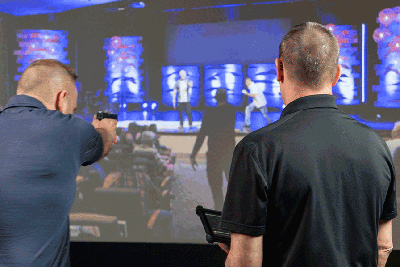
Muscle memory is a term that is often associated with sports. For example, professional athletes, musicians, and construction workers rely heavily on muscle motor skill retention to perform their best, especially in high-stress situations. Shooting a gun is no different.
While many traditional firearms training classes teach shooters the basics of shooting a gun, responsible gun ownership, and the laws associated with carrying a concealed weapon, the classes don't help shooters master muscle memory.
Why is this important?
Muscle memory can help to instill efficiency and speed into a shooter's techniques. In addition, it can allow them to master safe handling techniques in a way that becomes second nature. And while that might not seem valuable to hobbyists, for individuals using guns as a form of self-defense or on-the-job as a law enforcement professional, muscle memory can mean the difference between life and death.
How to Improve Muscle Memory in High-Stress Situations
Naturally, a body is not conditioned to know how to react to a stressful situation adequately. Especially when it comes to a hazardous situation, it's not uncommon for the body to freeze up and panic under a given situation's immense stress.
Untrained shooters may feel protected by carrying a gun, but the weapon is only as good as the shooter. Being able to assess a situation, remain calm, pull a gun from a concealed position, determine shot placement and get a clear sight picture is virtually impossible without practice.
Most self-defense situations happen quickly and only leave the shooter fractions of a second to make a life-altering decision. Even if a shooter is well-versed in the correct protocol, it doesn't mean their body will automatically respond in a timely and effective manner. Simply knowing the right thing to do in a stressful situation is not enough.
The increased heart rate and adrenaline rush during a high-stress situation can cause a temporary loss of fine motor skills, auditory exclusion, and tunnel vision. These symptoms make it impossible to think rationally. Therefore, muscle memory is the only way for a shooter to efficiently and safely respond during a stressful situation.
It takes practice, repetition, and proper training to give a body the fuel it needs to take over in a high-stress situation. Through repetition and firearms training, the body can establish vital neurological pathways that allow shooters to take action without missing a beat. This means building muscle memory for all aspects of a weapon's operation. From drawing from concealment to manipulating safety devices, all of these things will impact execution.
Muscle memory is a powerful tool for anyone who needs to perform when the pressure is on. Developing muscle memory is invaluable for law enforcement officers, CCW license holders, home defense, but it is also beneficial for qualification courses, competitions, and challenges.
Develop Muscle Memory in an Environment that Promotes Proper Technique
Mastering proper technique is critical when it comes to building muscle memory. Developing muscle memory through incorrect techniques will only make it harder to build confidence in high-stress situations. Training with reputable and experienced instructors in an environment designed to build muscle memory is the best course of action for any shooter. Engaging in hands-on practice, situational awareness training drills, and mastering pulling from concealment are all taught at your local Engage Virtual Range location. Learn more.